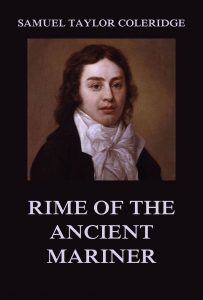Rime Of The Ancient Mariner – Samuel Taylor Coleridge
Of all Mr. Coleridge’s productions, the Ancient Mariner is the only one that we could with confidence put into any person’s hands, on whom we wished to impress a favourable idea of his extraordinary powers. Let whatever other objections be made to it, it is unquestionably a work of genius—of wild, irregular, overwhelming imagination, and has that rich, varied movement in the verse, which gives a distant idea of the lofty or changeful tones of Mr. Coleridge’s voice.
Format: Paperback.
Rime Of The Ancient Mariner.
ISBN: 9783849673529.
Available at amazon.com and other venues.
Coleridge’s comments to his masterpiece (from wikipedia)
In Biographia Literaria, Coleridge wrote:
The thought suggested itself (to which of us I do not recollect) that a series of poems might be composed of two sorts. In the one, incidents and agents were to be, in part at least, supernatural, and the excellence aimed at was to consist in the interesting of the affections by the dramatic truth of such emotions, as would naturally accompany such situations, supposing them real. And real in this sense they have been to every human being who, from whatever source of delusion, has at any time believed himself under supernatural agency. For the second class, subjects were to be chosen from ordinary life…In this idea originated the plan of the ‘Lyrical Ballads’; in which it was agreed, that my endeavours should be directed to persons and characters supernatural, or at least Romantic; yet so as to transfer from our inward nature a human interest and a semblance of truth sufficient to procure for these shadows of imagination that willing suspension of disbelief for the moment, which constitutes poetic faith. … With this view I wrote the ‘Ancient Mariner’.
In Table Talk, Coleridge wrote:
Mrs Barbauld once told me that she admired The Ancient Mariner very much, but that there were two faults in it — it was improbable, and had no moral. As for the probability, I owned that that might admit some question; but as to the want of a moral, I told her that in my own judgement the poem had too much; and that the only, or chief fault, if I might say so, was the obtrusion of the moral sentiment so openly on the reader as a principle or cause of action in a work of such pure imagination. It ought to have had no more moral than the Arabian Nights’ tale of the merchant’s sitting down to eat dates by the side of a well, and throwing the shells aside, and lo! a genie starts up, and says he must kill the aforesaid merchant, because one of the date shells had, it seems, put out the eye of the genie’s son.
(The text of the last section was taken from a Wikipedia entry and is available under the the Creative Commons Attribution-ShareAlike License.)
Publisher’s Note: This book is printed and distributed by Createspace a DBA of On-Demand Publishing LLC and is typically not available anywhere else than in stores owned and operated by Amazon or Createspace.

